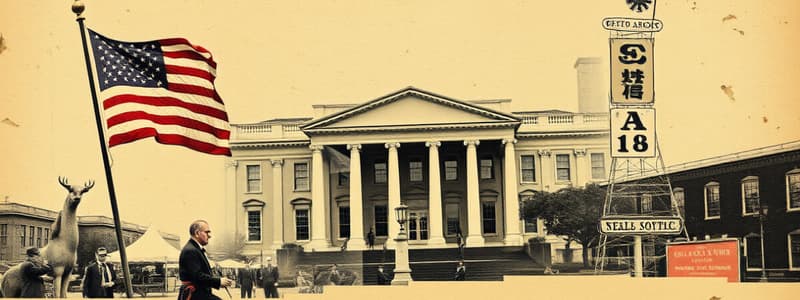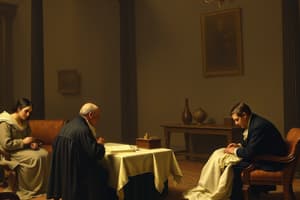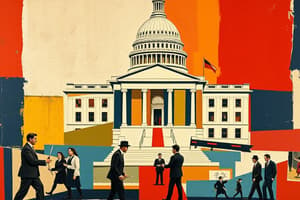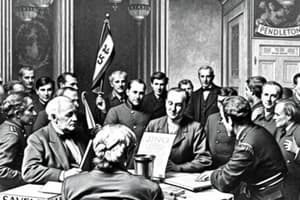Podcast
Questions and Answers
What did the Pendleton Act of 1883 create?
What did the Pendleton Act of 1883 create?
- A prohibition on drinking
- A system based on competitive exams (correct)
- A system based on inheritance
- A government agency to regulate tariffs
What is the role of the Civil Service Commission?
What is the role of the Civil Service Commission?
To oversee the administration of exams for federal jobs.
Who were the Republican nominees for the Election of 1880?
Who were the Republican nominees for the Election of 1880?
James Garfield and Chester A. Arthur.
Who won the Election of 1884?
Who won the Election of 1884?
What was the outcome of the Election of 1888?
What was the outcome of the Election of 1888?
Who proposed the theory of Social Darwinism?
Who proposed the theory of Social Darwinism?
The 14th Amendment was interpreted to include only individuals.
The 14th Amendment was interpreted to include only individuals.
What were Blue Laws?
What were Blue Laws?
What was the significance of the term 'Rum, Romanism, and Rebellion'?
What was the significance of the term 'Rum, Romanism, and Rebellion'?
What did Acres of Diamonds advocate for?
What did Acres of Diamonds advocate for?
Who were the Half Breeds?
Who were the Half Breeds?
What did Stalwarts support?
What did Stalwarts support?
Who was Benjamin Harrison?
Who was Benjamin Harrison?
What is notable about Grover Cleveland?
What is notable about Grover Cleveland?
What were Mugwumps known for during the 1884 Election?
What were Mugwumps known for during the 1884 Election?
Who led the Woman's Christian Temperance Union (WCTU)?
Who led the Woman's Christian Temperance Union (WCTU)?
Flashcards
Merit System
Merit System
A system that selects government employees based on merit, using competitive exams, to eliminate patronage and favoritism.
Civil Service Commission
Civil Service Commission
A government agency established by the Pendleton Act to oversee the administration of competitive exams for federal job positions, ensuring fair hiring practices.
Social Darwinism
Social Darwinism
The application of Darwin's theory of evolution to human society, emphasizing competition and 'survival of the fittest' in social and economic contexts.
Survival of the Fittest
Survival of the Fittest
Signup and view all the flashcards
Blue Laws
Blue Laws
Signup and view all the flashcards
Rum, Romanism, and Rebellion
Rum, Romanism, and Rebellion
Signup and view all the flashcards
Acres of Diamonds
Acres of Diamonds
Signup and view all the flashcards
Halfbreeds
Halfbreeds
Signup and view all the flashcards
Stalwarts
Stalwarts
Signup and view all the flashcards
Benjamin Harrison
Benjamin Harrison
Signup and view all the flashcards
Grover Cleveland
Grover Cleveland
Signup and view all the flashcards
Mugwumps
Mugwumps
Signup and view all the flashcards
Frances Willard
Frances Willard
Signup and view all the flashcards
Woman's Christian Temperance Union (WCTU)
Woman's Christian Temperance Union (WCTU)
Signup and view all the flashcards
Stalwarts
Stalwarts
Signup and view all the flashcards
14th Amendment's impact on business
14th Amendment's impact on business
Signup and view all the flashcards
Pendleton Act of 1883
Pendleton Act of 1883
Signup and view all the flashcards
James A. Garfield
James A. Garfield
Signup and view all the flashcards
Election of 1884
Election of 1884
Signup and view all the flashcards
Election of 1888
Election of 1888
Signup and view all the flashcards
Impact of the 14th Amendment on business
Impact of the 14th Amendment on business
Signup and view all the flashcards
What is the Civil Service Commission?
What is the Civil Service Commission?
Signup and view all the flashcards
What is Social Darwinism?
What is Social Darwinism?
Signup and view all the flashcards
What are Blue Laws?
What are Blue Laws?
Signup and view all the flashcards
What was "Rum, Romanism, and Rebellion"?
What was "Rum, Romanism, and Rebellion"?
Signup and view all the flashcards
What was "Acres of Diamonds"?
What was "Acres of Diamonds"?
Signup and view all the flashcards
Who were the Halfbreeds?
Who were the Halfbreeds?
Signup and view all the flashcards
Who were the Stalwarts?
Who were the Stalwarts?
Signup and view all the flashcards
Who was Benjamin Harrison?
Who was Benjamin Harrison?
Signup and view all the flashcards
Who was Grover Cleveland?
Who was Grover Cleveland?
Signup and view all the flashcards
Who were the Mugwumps?
Who were the Mugwumps?
Signup and view all the flashcards
Who was Frances Willard?
Who was Frances Willard?
Signup and view all the flashcards
What was the Woman's Christian Temperance Union?
What was the Woman's Christian Temperance Union?
Signup and view all the flashcards
What is a merit system?
What is a merit system?
Signup and view all the flashcards
Who was James A. Garfield?
Who was James A. Garfield?
Signup and view all the flashcards
What was significant about the 1884 election?
What was significant about the 1884 election?
Signup and view all the flashcards
What was significant about the 1888 election?
What was significant about the 1888 election?
Signup and view all the flashcards
Study Notes
Pendleton Act of 1883
- Established a merit-based system for selecting federal employees through competitive exams.
- Aimed to eliminate patronage and appoint based on ability rather than social class.
- Created the Civil Service Commission to oversee the exam administration.
Civil Service Commission
- Government agency responsible for administering exams for federal job positions.
- Formed under the Pendleton Act to ensure fair hiring processes.
Election of 1880
- Republican candidates: James Garfield and Chester A. Arthur; Democratic candidate: Winfield Scott.
- James Garfield won but served only 200 days before being assassinated by Charles Guiteau in 1881.
Election of 1884
- Featured Grover Cleveland (Democrat) against James G. Blaine (Republican).
- Cleveland won, but faced allegations of fathering an illegitimate child, leading to political mockery.
Election of 1888
- Grover Cleveland (incumbent) vs. Benjamin Harrison (Republican nominee).
- Cleveland won the popular vote but lost the presidency due to Harrison's Electoral College majority.
Social Darwinism
- Concept developed by philosopher Herbert Spencer that applied Darwin's theories of evolution to societal progress.
- Emphasized competition and "survival of the fittest" in social and economic contexts.
Significance of the 14th Amendment
- Interpreted to apply to both individuals and corporations.
- Limited state powers to regulate private business, impacting economic policies.
Blue Laws
- Regulations that prohibited perceived immoral behaviors, such as drinking alcohol on Sundays.
- Reflected cultural and political values of the era.
"Rum, Romanism, and Rebellion"
- Insult directed at Irish immigrants during the 1884 presidential campaign.
- Contributed to James Blaine's loss of New York's electoral votes, aiding Cleveland's victory.
Acres of Diamonds
- Lecture by Russell Conwell promoting the philosophy of Social Darwinism.
- Advocated for fixed economic classes and a laissez-faire approach to the economy.
Halfbreeds
- Faction of Republicans led by James G. Blaine, accused of reform motives for personal gain.
- Supported civil service reform but often viewed as self-serving.
Stalwarts
- Conservative Republican faction that supported the spoils system.
- Opposed civil service reforms and favored traditional political patronage.
Benjamin Harrison
- 23rd President of the United States known for implementing the McKinley Tariff.
- Increased federal spending during his presidency.
Grover Cleveland
- The only U.S. president to serve two nonconsecutive terms (22nd and 24th).
- Advocated for civil service reform and established the Interstate Commerce Commission.
Mugwumps
- Republicans who switched allegiance to support Democratic candidate Grover Cleveland in 1884.
- Advocated for political reforms such as secret ballots and literacy tests.
Frances Willard
- Prominent suffragist and leader of the Woman's Christian Temperance Union (WCTU).
- Believed women's perspectives could positively influence politics.
Woman's Christian Temperance Union (WCTU)
- Organization aimed at mobilizing women as a political force against alcohol consumption.
- Although it struggled in political arenas, it served as a precursor to later women's rights movements.
Studying That Suits You
Use AI to generate personalized quizzes and flashcards to suit your learning preferences.




